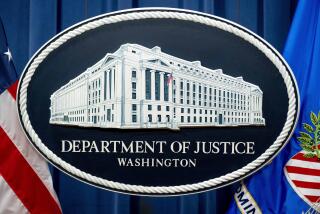An Inch-by-Inch Advance
- Share via
Pakistani security forces capture a key Al Qaeda suspect in a bloody shootout. Singapore arrests 21 terrorism suspects, including some who allegedly had been in Al Qaeda training camps. The FBI breaks up a possible “sleeper cell” in the quiet Buffalo, N.Y., suburb of Lackawanna. The first two events are familiar, the third jarring. Together they comfort, suggesting that after months of few clear victories, the multinational war on terrorism is progressing.
John Walker Lindh was the first U.S. citizen to become known as an American Talib, and the five alleged Al Qaeda operatives arrested in the former steel mill city of Lackawanna--along with a sixth picked up in Bahrain--may also fit into that category. They are accused of training at an Al Qaeda base in Afghanistan. Prosecutors say they spent several weeks in the Afghan camps now notorious for teaching aspiring terrorists everything from how to obtain false identification to how to concoct poisons and explosives. The complaint charges that while they attended the camp, Osama bin Laden himself came to rail against the United States and Israel.
If a court finds the six suspects conspired to assist Al Qaeda, they are, whatever the formal charges, traitors. Until then, fairness and principles of due process require that these Americans be presumed innocent and that they be given the full protections of the Constitution. Beyond that, their arrests challenge fellow citizens to uphold American ideals by continuing to shun anti-Arab or anti-Islamic bias.
The FBI reports that many Lackawanna Muslims helped its investigation. Not everyone in Karachi was so cooperative, which makes Pakistan’s arrest of Ramzi Binalshibh all the more heartening. Some analysts have long suggested that Pakistan’s security service, with its old ties to the Taliban, is more eager to help Al Qaeda than the United States. But the force proved its loyalty to the war on terrorism--and its courage--by facing grenade explosions and automatic weapons fire in arresting Binalshibh and his cohorts.
By his own account, Binalshibh, a Yemeni citizen, had plenty to do with the planning of the 9/11 attacks. Appearing a week ago on Al Jazeera, the Arab TV network, he triumphantly showed off a suitcase of “souvenirs”--flight manuals, CD-ROMs and other items that a cell in Hamburg, Germany, may have used to help prepare for last September’s airliner attacks.
His arrest gives federal investigators a chance to learn more about Al Qaeda’s operations. There is no mystery about the fanatical mind-set that led to the attacks. But a moral obligation to the dead and survivors of 9/11 compels investigators to unravel the chain of events that led to the destruction of the World Trade Center, the attack on the Pentagon and the crash in Pennsylvania. More important, understanding Al Qaeda will give the world’s anti-terror agencies a better intelligence arsenal for thwarting mass murder.
The war on terrorism will never be as fast and conclusive as Americans desire. But the arrests in Pakistan and Singapore, along with that of America’s homegrown suspects, offer the world’s anti-terror warriors timely encouragement to keep battling.
More to Read
Sign up for Essential California
The most important California stories and recommendations in your inbox every morning.
You may occasionally receive promotional content from the Los Angeles Times.













